Pungent, compelling smelling ingredients are part of the magic of many Asian dishes. The problem comes when they get too stinky. Case in point is over-ripened, “mature” kimchi. It tastes great in dumpling fillings, fried rice, and tofu hot pots, but how do you live with it in your kitchen?
I recently had a jar of over-the-hill kimchi spew its brining liquid all over my apron, right before I was suppose to teach a cooking class. Its volcanic action continued for about 5 minutes after sitting with the lid off. I changed to a clean apron and explained the smell to students as they filed into the room. Thank gawd that the dish we made (Korean mandu filled with tofu and a smidgen of kimchi) turned out well.
Then there was this bag of Trader Joe’s kimchi in my fridge. Despite the July 2012 expiration date, the kimchi looked like it was about to pop last week. Kimchi knows no time boundaries.
To relieve the gaseousness, I snipped the bag open and the air inside exploded outward with a popping noise. Then came the inimitable kimchi fragrance. It lingered in the air. I didn’t want to throw the kimchi away and looked for ways to arrest its aroma.
Barring a dedicated kimchi refrigerator that keeps the stuff at near freezing temps (I don’t eat enough to justify the cost) or an airtight kimchi container (I own one but didn’t have fridge space for it), I opted for plastic bags. I decided to experiment with:
1) Putting the Trader Joe’s bag inside a zip-top plastic bag, thereby effectively double bagging the kimchi.
2) Sliding some kimchi into a Japanese kimchi deodorizing bag (pictured at the top), which I’d bought at Daiso, a chain of Japanese 100 Yen ($1.20 USD) stores.
The kimchi bag claims to have some kind of ceramic in the plastic that helps to “decompose bad odors”, particularly of fish, meat, eggs and onions – though the front highlights kimchi in text and photography. The back of the packaging is pretty clear about the bag's wondrous capabilities:
After a couple of hours, I sniffed and there was a faint kimchi aroma through both the Japanese bag and the zip-top plastic bag.
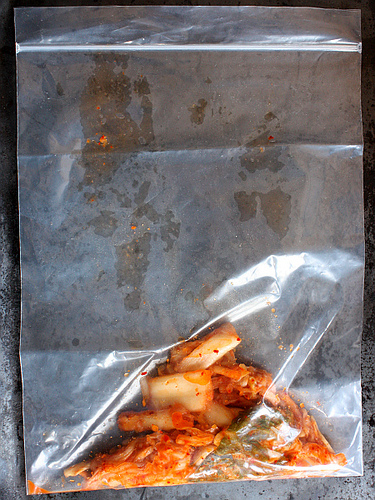
It was stronger coming from the Japanese bag (above). To be fair, I stuck the Japanese bag inside another Japanese bag and waited overnight.
The next morning, we opened the fridge and eeew, the kimchi smell was pretty strong. I did the sniff test. It was the Japanese deodorizing bag that leaked the stinkiness most. I stuck it into the zip-top bag and returned for another sniff test an hour later. The smell was gone from the fridge.
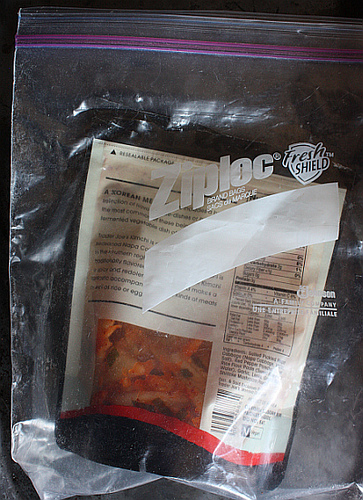
My lesson learned for dealing with stinky kimchi in this instance? Just double bag it in a zip-top bag. When I’ve had a lot of kimchi (thanks to a very generous friend, Yun Ho), I put it all into an airtight glass or plastic container and kept it refrigerated.
Korean markets sell dedicated kimchi containers of varying sizes but I find that what I have around the house works just fine. On the Maangchi Korean food site, people suggested putting a dish of ground up coffee beans in the fridge to suck up the smell; replace the coffee every few weeks.
I hoped that the deodorizing bags would work well but no cigar, folks. On the other hand, zip-top bags are fabulous and handy. Keeping the stinky smell of food ingredients can be challenging. If you have tips, don't keep them to yourself.













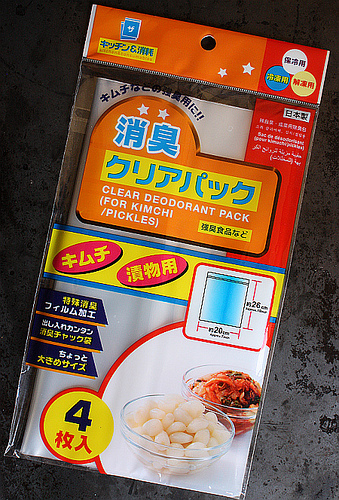
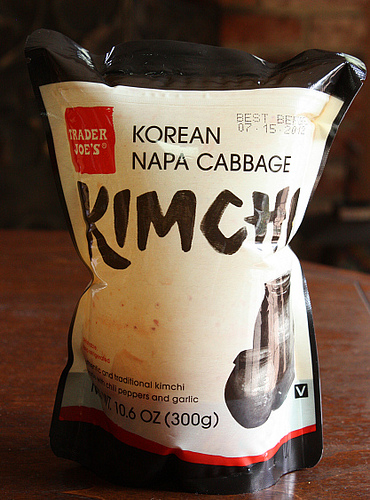
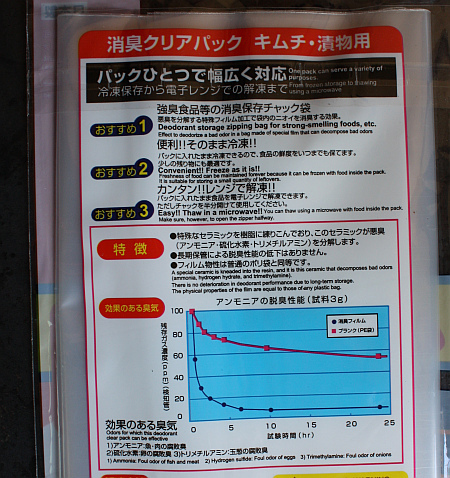




Caroline says
I am not Korean but I love Kimchi and always keep some in the fridge. I just keep it in a airtight glass container and there is no smell problem at all this way.
Yun Ho says
Hi Andrea:
Yes, Double bagging with Ziploc bag is probably the best way to keep Kimchi unless you have an airtight containter. Also try to keep Kimchi at the bottom shelf and deep in the back of the fridge where it is the coolest and less exposed to air when you open your fridge.
Andrea Nguyen says
Thanks for the first-hand, Korean tip!
Andrea Nguyen says
Yun Ho,
I wouldn't have never thought of the placement in the fridge as being significant but it totally matters! Duh ! Thanks. ^_^
Stacie Fontinell says
Hi Andrea,
I too bought that Trader Joe's kim chi and the bag did the same blow up thing that yours did. I took it back to TJ's and asked if that was how it was supposed to look...and they said no and had me return it. Im not sure if kim chi can go bad, but didn't want chance it!
maggie says
I wonder if you could freeze it in small portions, and just defrost a small amount at at a time?
Yun Ho says
When a Kimchi package starts to blow up, it means that the fermentation process of Kimchi is speeding up and can be caused by two things:
1) Temperature - Fermentation of Kimchi can be slowed when it is at almost freezing temperature. Otherwise, fermentation of Kimchi would speed up in a warmer temperature.
2) Packaging - If Kimchi were prepared in warm environment and not packaged immediately, the fermentation process would have already started. Try to buy Kimchi's with latest packaged dates.
Kimchi doesn't go bad but it would have a more pungent (sour) taste that would be more suited for making kimchi soup,mungbean pancake, kimchi mandu.
For your information, eating Kimchi before it turns pungent(sour), is the healthiest option where "healthy bacteria," lactobacilli, are most prevelant. When it starts to turn sour, presence of citric acid actually kills these "health bacteria." For those not familiar with lactobacilli, they are abundant in yogurts.
Lastly, freezing Kimchi would work but you would not be able to enjoy the crunchy texture of napa cabbage as with fresh kimchi
J Kain says
I'd opt for the glass jar over plastic bags as the acid in the kimchi will leach dioxin and BPA (if the bag contains BPA) into the food. Not to be a downer 🙂
Andrea Nguyen says
Yun Ho,
Great thorough explanation of the differences between fresh and mature kimchi. I didn't know about the good bacteria. I have a feeling that the Trader Joe's kimchi was packaged or shipped in a warm situation. The expiration date is July yet it "blew" up in the bag prematurely. The stuff you sent me last year took a long time before it built up noticeable gas in the bag.
[Everyone -- Yun Ho sent me 5 kinds of kimchi from Korea. He hand carried them over then overnight mailed them. Don't think Trader Joe's did that. for its customers!]
Andrea Nguyen says
Not a downer but a very good point. Thanks!
Cheryl says
I have a question. I love fresh kimchi, but when I make a batch, it's a BIG batch; and I usually end up storing it in the fridge right away. What I have noticed is that it usually starts to ferment slowly, and if I don't let the gas out of my mason jars occasionally, they leak a little from the pressure. Then what happens is that they stop bubbling alltogether. So, my question is: Does the fermentation process eventually stop at some point, or has something gone drastically wrong with my kimchi? And thank you for all you do, Andrea!! You're a wonderful inspiration (and resource!).
Cheryl 🙂
Laura says
Hi Andrea,
I was laughing at the title of your post. Having lived in Japan, I was fairly sure that the special bag for kimchi would have worked. I've been concerned about this problem for many years!
I used to only buy and eat kimchi when my husband was traveling so that there would be plenty of time for the smell coming from me (and the refrig) would be faint enough by the time he returned so that it would be a "welcome home" for him. I used to wrap the glass jar of kimchi in a plastic veggie bag from the grocery store and then put that in a zip top bag to further contain the aroma. It seemed to work because my husband wouldn't notice it too much. As for me, I found that Breath Assure pills would work in making me not too noticeable after eating all of that kimchi! If I didn't have a husband with such a sensitive nose, I would probably eat much more kimchi than I do because I love it so much!
Yun Ho says
Oops, it should be acetic acid, not citric acid.
Yun Ho says
During the fermentation process of Kimchi, there are two main "good bacterias" at work. At the early stage, bacteria called Leuconostoc are active in creating lactic acid, acetic acid and carbon dioxide(yes, the bubbling effect). At the mid-stage and latter, lacto bacilli promotes the fermentation of lactic acid only. This is why it stops bubbling therefore, there is nothing wrong with your Kimchi. Hope this helps.
charsiew says
your pic of the near-term kimchi pack reminds me of my sister, who kept her pack of kimchi in the fridge and it literally exploded in her fridge!! Her helper wasn't too pleased about having to clean the entire contents of the fridge, not to mention the smell of it!! 🙂
Andrea Nguyen says
Near-term kimchi is so very appropriate. Pregnant kimchi. LOL.
Andrea Nguyen says
Oh yes... use a strong breath mint (or two) and chew gum after eating kimchi. My husband is the same way, Laura. 🙂
Cheryl says
It sure does... Thanks! And, how wonderful you are for bring back so much Kimchi! 🙂
Dolt Gabi says
Good luck ,Great post,y love you!Thanks for the info it had cleared out too many things in my mind. Your recommendations are really good.
http://www.raisinshealthbenefits.com
Ai Nhi says
As much as I enjoy your posts, why do I keep getting them twice? The second time always comes about 15 days after the first post. Please fix this problem, please.
About storing kimchi, I definitely encourage everyone to use airtight glass containers. Contrary to plastic bags, glass containers are aesthetically pleasing, durable and less pollutive.